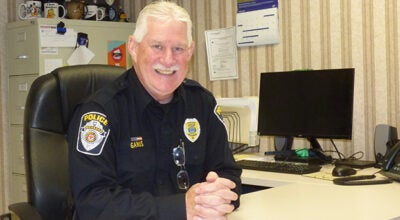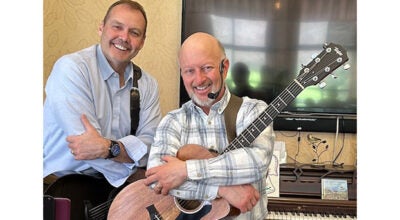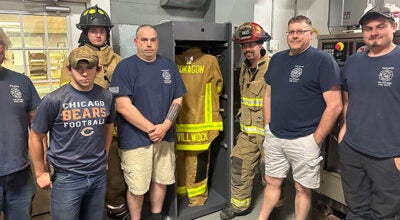SMC horse science program recruiting new mentors
Published 6:40 pm Monday, February 8, 2016
Horses serve as a “window to agriculture.”
“People who have never touched livestock have an affinity for horses, whether a pony ride when they were little or watching the Budweiser Clydesdales,” according to Dr. Christine Skelly, Michigan State University associate professor.
Skelly Feb. 4 convened the first advisory meeting for the applied horse science program at Southwestern Michigan College through MSU in the David C. Briegel Building on SMC’s Dowagiac campus.
Industry resources, such as Cindy Nimtz, trainer and owner of Circle “C” Stable, Benton Harbor; Cassopolis veterinarian Dr. Garry “Joe” Fedore; and Kelly Dargus, Berrien RESA career technical education consultant, conferred with Skelly; Stacey Rocklin, MSU’s coordinator at SMC; Kathie Gries, SMC Career Planning Center manager; and SMC Admissions Director Jason Smith about mentoring.
“As we have more students,” Rocklin said, “I can’t guide every single one. And I want students to have industry contacts, which is really important to keeping their enthusiasm going. People in the industry can see more of what’s going on than I can from education.”
“The more exposure they get to a variety of things opens their eyes to different opportunities while getting experience with animals, whether it be a horse, cow or pig,” Dr. Fedore said.
Horse science, launched fall semester with six students, encompasses horse farm management, feeding and nutrition, reproduction, behavior, horsemanship, exercise and judging.
A two-year applied horse science certificate lets students pursue an in-depth curriculum outside of the traditional classroom and provides learning experiences that improve the profitability, animal welfare, environmental stewardship and recreation by horse enthusiasts.
“We do a lot of barn manager placements out of our two-year program,” said Skelly, who came to Michigan from Texas.
Danyel Ransler, president of SMC’s Agriscience Club, enjoys her interactive online horse class.
“I like it a lot because I can move at my own pace,” said Ransler, who commutes an hour to Dowagiac three times a week from Gobles.
She enrolled in agricultural operations to bolster business skills before taking over her family’s dairy farm.
Ransler, who attended Van Buren County Technology Center in Lawrence during high school, considers horses “something on the side, like a minor.”
Ransler earned six MSU credits fulfilling her state FFA degree.
Nimtz earned a Western Michigan University teaching degree in 1992.
“I worked construction for 15 years because I couldn’t find a teaching job,” she said. “I built churches, schools and horse facilities.”
After teaching riding lessons and with 15 years 4-H involvement, the equestrian team coach started her own stable in 2001.
She boards, trains, teaches riding lessons and partners with Niles Community Schools for Reaching for the Reins with Cedar Lane Alternative School.
“I had my own horse I showed at 9,” Nimtz said. “It was always my dream to do something like this. Giving riding lessons is so much more than ‘toes up, heels down.’ They learn a lot about themselves getting ready to be on horses.”
MSU’s Institute of Agricultural Technology in the College of Agriculture and Natural Resources (CANR) partnered with SMC in a unique way to help students earn MSU certificates while working toward an associate degree.
Students take at least 21 credits from SMC recognized by MSU toward completion of a certificate, significantly lowering their overall program cost.
Students in these practical, hands-on programs take classes taught by MSU faculty using campus resources including MSU labs, greenhouses and farms.
A requirement of all programs is an industry-related professional internship that lets students apply what they’ve learned in the classroom.
Students use principles of science, technology, engineering, mathematics, business and creative design in tackling some of the world’s big problems related to food, energy and the environment.
Skelly said, “There are two focuses in getting them into an industry setting. The first is a clerkship, different from an internship. A clerkship is more of a learning environment, with guidance and oversight to help students learn skills they need to complete an internship, which with our two-year program on campus is usually paid and a full summer someplace different than their hometown. We place students all over the country. We have a student right now working with a trainer in Florida.”
“SMC awards 10 $2,500 scholarships each year through its Guse FFA Scholarship,” according to William M. White, secretary of the SMC Board of Trustees.
Horse science is one of five MSU certificates along with agricultural operations, fruit and vegetable crop management, viticulture and landscape management.
All MSU certificates fit within one SMC Associate in Applied Science (AAS) degree.
Certificate programs consist of 48 credits (27 MSU, 21 SMC) packaged within the 60-credit AAS).
Students who choose to continue at MSU transfer their courses and receive preferential admittance.
About Southwestern Michigan College
Southwestern Michigan College is a public, residential and commuter, community college, founded in 1964. The college averages in the top 10 percent nationally for student academic success based upon the National Community College Benchmark Project. Southwestern Michigan College strives to be the college of first choice, to provide the programs and services to meet the needs of students, and to serve our community. The college is accredited by The Higher Learning Commission of the North Central Association of Colleges and Schools and is a member of the American Association of Community Colleges.






